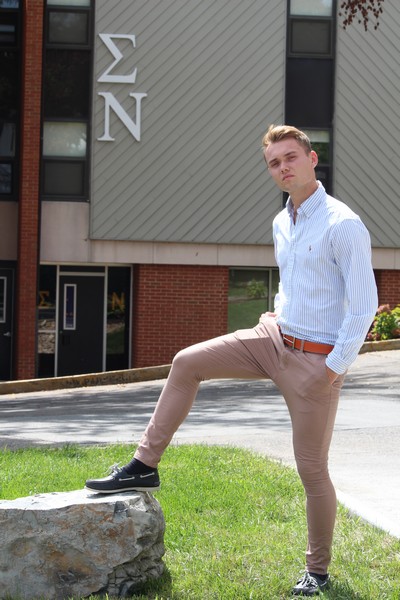Features
By Jesse Thomason (Texas Christian)
American Flag shorts. Social media posts riddled with #Merica. This is the stereotypical iconography people across the country use when picturing a fraternity man. And why not? Fraternities seem to be uniquely American institutions. What kind of experience, then, could a fraternity offer to a young man not from America? This is the question that comes to mind when first speaking with Jordan Forrester (James Madison), the Commander of Iota Delta Chapter.
As he set up a large classroom for a chapter-wide workshop, Jordan wondered if he was the first ever international student to serve as Commander of a Sigma Nu chapter. It’s impossible to say, really, but seems unlikely given Sigma Nu’s almost 150-year history. However, it’s tough to imagine the list of international students who have served as Commander is a terribly long one.
Jordan Forrester is a Junior Computer Information Systems major from Leicester, England – a mere 3,692 miles from his new home away from home in Harrisonburg, Virginia. His journey across the Atlantic was fueled by his desire to play soccer at James Madison University. To focus on his studies, Jordan quit the soccer team at the end of his sophomore year, but his natural affinity for leadership compelled him to find other responsibilities, such as leading over 100 men as Commander. “I chose this position [and ran] against four or five other people. And I was the youngest of them to run,” he recalls of that election. The biggest difference Jordan has seen between being a leader on the field and in the chapter is sheer manpower – 25 men are on the soccer team while Iota Delta has grown to over 100 men. It’s safe to assume conflicts will occasionally come up when there are too many opinions together in one room, but at the end of the day, Jordan finds one similarity can bridge any gap between brothers. “On the soccer team, we were a close-knit group. We used to call each other one big family, and I feel like Sigma Nu has kind of the same values. We’re a brotherhood. We’ll always look out for each other.” This family aspect of fraternity is imperative for someone so far from home.
Jordan’s parents took a leap of faith by letting him attend school in the United States. Many aspects of college life were completely, and quite literally, foreign to Jordan’s parents. “In England, there’s no such things as fraternities. There’s college groups, social groups, but they don’t have as much history or brotherhood,” he says of encountering Fraternities for the first time. “When I first told my parents what a fraternity was, they were really intrigued by it. My family just wanted me to be safe in the U.S. and to have a lot of friends and just make sure I wasn’t alone. Being an international student, you can be one of the loneliest people on campus sometimes, but being in a fraternity takes away that aspect.” When Jordan explained that he’d have a support system of over 100 men across campus, his parents bought into Sigma Nu. “They loved that I was settling down in this country and this school.”

The fact that neither Jordan nor his parents had ever heard of a fraternity before could be seen as an advantage. Jordan had no preconceived notion about what fraternity life was going to look like when he joined, so he was able to cultivate his own fraternity experience. When most men are beginning college and face the decision as to whether they’re interested in joining a fraternity, a flood of pop culture references hits them with information about what they know a fraternity to be. Popular social media accounts, websites, and films have all contributed to the growing idea that fraternities were built to create opportunities for debauchery and poor behavior, despite those images and ideas going directly against almost every fraternity’s principles and values.
The history of Sigma Nu, though, is a point of interest when discussing a fraternity with an international student. Like many fraternities, Sigma Nu’s founding and history is very much tied to the history of the United States, which may prove to be a barrier keeping some international students from joining. Jordan, however, was not distracted by this and found that the core values of Love, Honor, and Truth are basic enough principles to not be dependent on any particular nationality.
Since neither the historical aspect nor any preconceived ideas about fraternities had been deciding factors in Jordan’s membership, a person might wonder what drew him to Sigma Nu. Fraternities were not something even remotely on Jordan’s radar upon his arrival on campus. In his time on the soccer team, Jordan found a stark difference between the life of a student athlete and the rest of campus life. “I was always hanging around the student athletes… I feel like in this country, the student athletes are very much in their little group away from the rest of campus life, so I wanted to be more connected to students who are not [athletes]. I wanted to mix in with that crowd because I’m only here on a five or six-year visa and I wanted to get the most out of my college experience.”
When it comes to Sigma Nu specifically, Jordan had a chance encounter that introduced him to the chapter. While still a student athlete, Jordan’s tutor for an Economics class was a senior in the chapter. Jordan’s tutor was preparing to begin post-graduation employment at Deloitte, a company Jordan hopes to work for in the future. He inquired about how his tutor got the job and his tutor explained that he had benefitted from the chapter’s alumni network. The next fifteen minutes were spent discussing the types of connections one might find in a fraternity. “One of the biggest draws for me was the connections out of college, because I want to stay in this country and look to live and work and pay taxes and have a house in this country after graduation… I felt that being in Sigma Nu could help me pursue that.”
Jordan’s desire to stay in America might make someone wonder what he misses most about England. While he did eventually mention friends and family, Jordan’s initial reaction was something entirely wholesome and tied closely to where we come from: food. “We have a food called ‘Toad in the Hole.’ It’s a pastry with a sausage in it and it’s got mashed potatoes and gravy and it’s very nice.” Additionally, Jordan misses the relaxed nature of conversations in England. “Your accents’ got a bit more fast pace to it. I feel like American people are a lot more enthusiastic,” Jordan says. “In my country, we’re very conservative. As the saying goes, we keep our doors closed… whereas, over here, there’s a big open-door community, especially at James Madison University. It’s a very friendly environment, not to say that England’s not friendly.”

Sometimes, you can’t go home, so home has to come to you. Jordan’s parents were finally able to travel to America and see him in August. They had never been to America before, so they made trips to Toronto, New York, Washington, D.C., and Boston, where Jordan was working for the summer. The last stop on the trip was Harrisonburg, where they enjoyed Jordan’s first few days of the semester. “It’s nice for them to see the environment I describe to them back home. Next time I tell them that I’m grabbing lunch in one of the dining halls, they’ll know where I am.” Familiarity is a wonderful and comforting thing which helps put Jordan’s parents at ease, but too much of it can stunt personal growth. This is the key difference Jordan identified between himself and the friends of his who stayed in England for school. “I think they probably wouldn’t have made as many friends, because a lot of my friends back home go to universities and college with each other, so they wouldn’t have as much social experience as I would. They’d make some other friends, but they wouldn’t have the same social experience like I’m having right now.” Outside the social aspect of their differences, Jordan suspects that his friends back home are receiving a much different education. “Academics are a lot different over here. I’ve had to take American History classes… so I was at a bit of a disadvantage. In England, you take your degree and do your major classes from day one.” That said, Jordan found that there are more similarities than differences between going to school in America and England.
Jordan’s time as a member and Commander of our Iota Delta Chapter is eye-opening. His lack of preconceived notions about fraternities is certainly a contributor to his excellence in the chapter. Perhaps being in a fraternity is not uniquely American. Perhaps fraternities are, instead, uniquely bound by their values and promises to uphold them. Jordan Forrester, then, is uniquely Love, Honor, and Truth.